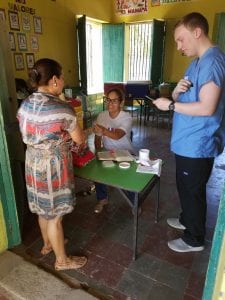Hello from Honduras! For those of you who don’t know, my name is David Fisher. I am a graduate pharmacy student from Cedarville University completing my last year of school. I just wanted to give you some insight about what the field of pharmacy looks like in Honduras and serving on a medical missions trip.
Pharmacy in general in Honduras is drastically different compared to the United States. The educational requirements in Honduras are far less than in the U.S and since the majority of public hospitals don’t have a pharmacy directly attached, communication between provider and pharmacist is practically nonexistent. Medical records are still in paper format only which can make it difficult to confirm anything about a patient in a timely manner. Medications that would be used commonly in the U.S to treat conditions such as diabetes or hypertension don’t exist in Honduras. On the other hand, medications that would rarely or never be used in U.S are seen all the time here. So all of these factors effect how we on the pharmacy side work during a medical missions trip.
For pharmacy on our team, it requires three things: Adaptation, Awareness, and Trust. What I mean by adaptation is that we are one day in a kindergarten classroom and the next day in the back office of a health center. Some days we have everything that gets prescribed and some days we are out in the first hour. It’s important in these situations to accept any changes that come up without any grumbling or frustration and think critically so that we can come up with alternatives for the days when our supplies are running low. The second item that is required for a successful trip is awareness. Honduras is a completely different environment, socioeconomic, and culture than the United States. So being aware of these differences is important if we are going to be effective at our jobs. For example: In Honduras the temperatures can reach 120 Fahrenheit so prescribing medications that can cause dehydration is bad idea. Similarly, giving a medication that requires refrigeration isn’t a good idea if no one in the village has a fridge. So when I assess any prescription I have to consider factors such as these which is something we take for granted living the U.S. The last item that is required at all times is trust. We in the pharmacy aren’t able to go through every detail of a patient every time we get a prescription. We don’t know how much pain a patient is truly experiencing, if something is an infection or just dry skin, or if a patient has told our nurses everything they need to know. Fortunately for us we are blessed with having a very talented team of nurses with years of experience in a variety of different practices. Trust me when I say that these are the ladies you want treating your family member. It didn’t take long for me to see that these were some very dedicated individuals who were eager to help others and learn from their preceptors. I consider myself very lucky to have worked beside just an incredible team inside and outside of the clinic.
I hope this helps you see a little bit into the world of pharmacy in Honduras. It’s been an amazing trip and I’m sorry to be leaving so soon. I’ve thoroughly enjoyed my time here and I loved working with this team. We will be seeing all of you really soon!


Very impressive work! I love to see this interprofessional approach.
Hi, This post is very important information. I have learning more. I really enjoyed its reading this post enough to search for writing this excellent article and helpful post thanks for sharing. https://www.faimission.org/
This post has taken me this long to process and reflect on the 2019 Honduras study abroad. China is a great place to study nursing because of its advanced healthcare system and prestigious hospitals. https://www.faimission.org/